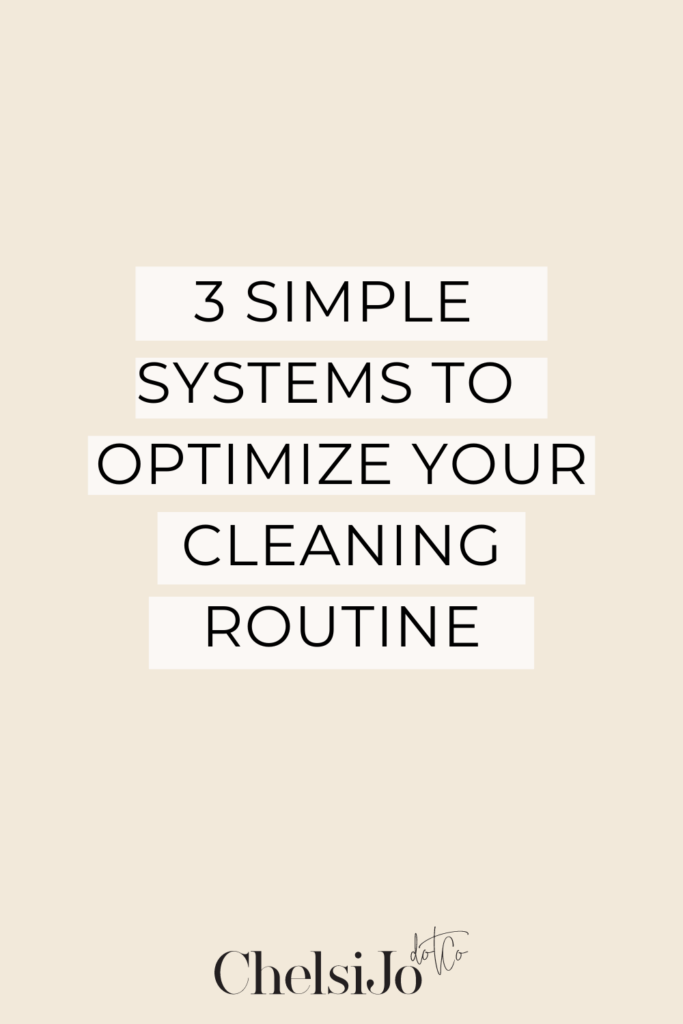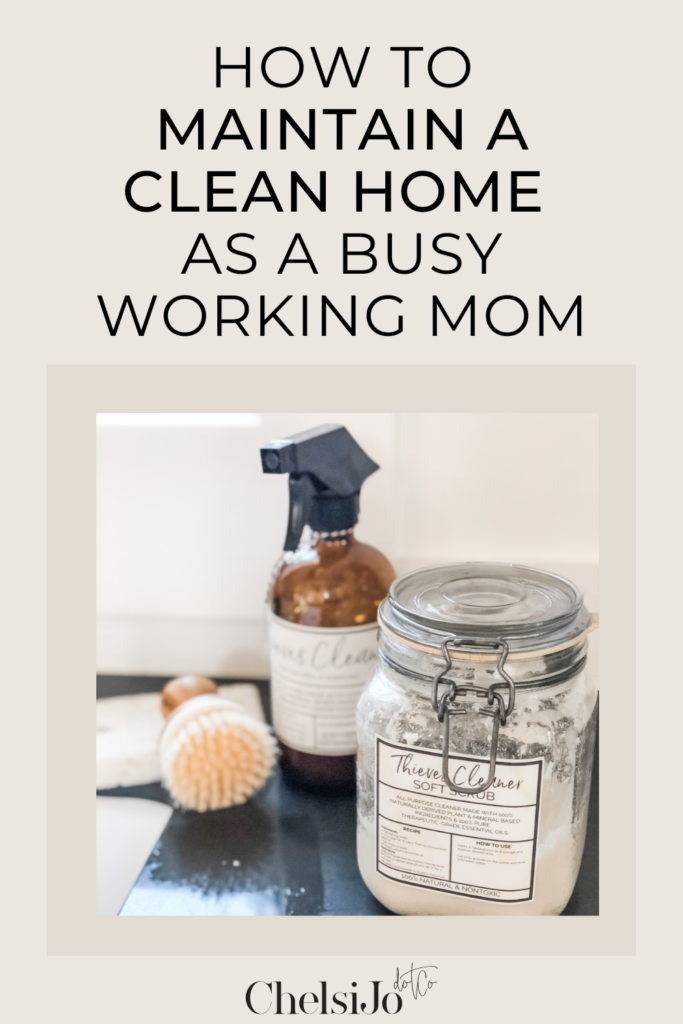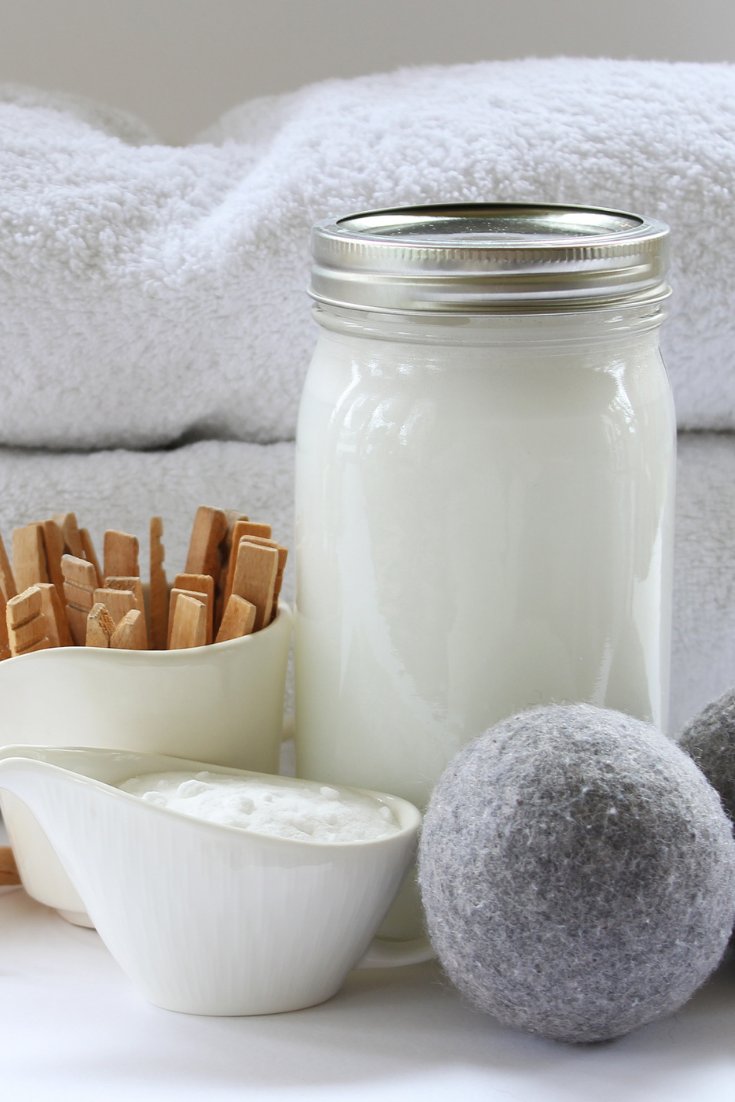Today I am breaking down how I handle keeping a clean house. It can be unbelievably hard to keep up with keeping a clean house when there are multiple children and adults in the house, let alone pets and visitors. The one thing I have come to realize about us moms is that we absolutely LOVE the feeling of a clean house. That feeling of relief we get when everything is done, when or home isn’t calling our name anymore and we can focus on other things, should be something we experience regularly. Therefore, I am sharing with you simple cleaning systems so you can live in peace!
Today’s post is going to teach simple cleaning systems in order to automate the remedial cleaning inside your home. Using these easy cleaning systems to enhance your cleaning routines is a total game changer. The best news ~ these three cleaning systems can be easily incorporated today and help make the change towards a cleaner and happier home.
The 3 Simple Systems To Optimize Your Cleaning Routine
Often, I get asked many questions regarding my system for cleaning routines. While, I have never considered myself to be an insanely clean or tidy person. However, once I was a wife and had multiple children, it became very important to me to maintain a clean home. Well, now it’s something that I love to do. Truly, I love to care for my home. Just as I do with everything in my life, I have a system for cleaning that will revolutionize how you feel about maintaining a clean home.
Simple System #1 – The Laundry
The first simple cleaning system focuses on the laundry. The purpose with this cleaning routine is establishing a system to stay ahead and on top of you and your family’s laundry. This is my system for laundry and what I think you absolutely need to do. You’re not gonna love it, you’re gonna think I’m crazy, and you’re gonna say, “That’s ridiculous!”, but I don’t care, you need to do it!
1. Get smaller laundry bins
Every single person in your house needs to have a small, single-load sized basket in their bedroom. Yep! You, your spouse, and every kiddo. I’m talking a small load. Seriously, a small basket for each person in your house to put their own laundry in. Right away this simplifies the process and makes the laundry seem less overwhelming.
2. Wash by texture
3. Let family members help
4. Pick specific washing days
Next, you need to pick a specific day, one day a week, for washing each single-load of laundry. Now, if your one-load bin of laundry is filling up more than once a week, you have too many clothes. Therefore, the most vital step in this entire concept of getting a grip on your laundry, is to reduce the amount of clothes in every single person’s closet.
Now that we’re out of that phase with Franki, she definitely has been moved into a capsule wardrobe system and she LOVES it. It makes doing laundry for her so much easier. She’ll come and tell me, “Mom, I’m out of clothes.” and I can just tell her, “Ok, laundry bin’s full, wash it and let’s put them away together.” and it’s done!
Once A Week
I force myself to do my laundry once a week because if I go longer than that, then the folding and putting it away becomes a chore. I have this clean load that just sits on the floor for days and days and days on end because by the time it’s all washed, dried, and ready to put away, it’s become way later in the day and I’m no longer in that time block. When it’s a smaller load it takes me five minutes to get it all hung up, folded, and put away. And that is my simple cleaning system for laundry.
A Day Per Load
Every single person in your house can have a different day of the week for their load of laundry or you can do couple at a time. When I do it every single day, it gets done much more efficiently and I don’t have a load of laundry laying on the floor. When I try and do too much laundry at once I never end up completing the laundry cycle.
Try it either way, see which one works best for you. I’ve done both ways and prefer having one day of the week for each person, like every single Saturday is my personal laundry day, Mondays are Franki’s, Thursdays are Baylie’s, and Blaine does his own laundry. He likes it that way and I’m very grateful for that.
Simple System #2 – The Dishes
This one’s really fun! If you have a lot of people in your house, I’m going to encourage you to take an extra step in this system. There’s only four of us and the crux of this entire system revolves around one thing and one thing only: every single morning, your dishwasher needs to be ready to receive dirty dishes. Every morning, from now on.
What does that mean? For those of you with a lot of family members, that means every night you need to run your dishwasher. For us, we could run our dishwasher every single night, absolutely, and maybe you’re fine with that even though it’s not full. But for Blaine and me, we like to save on dishwasher pods and water, so we don’t wash until the dishwasher’s full.
Our Dish System
Let me walk you through this system because this has been really successful for us. We don’t do it 100% of the time. And when we don’t do it, we get caught up in the stupid cycle of dishes in the sink, tons of dirty dishes, and I hate it. But I’ve been doing this specific system long enough to know that when we do it, it is unbelievably successful! And like every system that I teach, you have to DO the system for it to work. It doesn’t just work for you.
Getting Everyone On Board
I’m still working on getting everyone on board with this system, specifically because there’s four of us contributing to the dirty dishes and two of those people are kids and Blaine is not home all the time. But here’s how it goes, you start out with a brand new, fresh, clean kitchen. There’s no dirty dishes anywhere. You have a small, and I’m talking tiny, dry rack. I have one that’s maybe 12 inches squared that looks like a little square of grass that I absolutely love, and everything needs to be put away out of it. If you don’t use a dishwasher, that’s fine, you still can do this exact same system. Start there at the dry rack with a clean slate.
The One Only Rule
Then there’s one rule and one rule only to this entire system, and everyone in your family has to understand what this new rule is. You are not allowed to put a dirty dish in the sink or on the counter. Ever. It does not live there. If it’s dirty, it either goes in the dishwasher or it’s a hand wash item and it gets washed immediately and gets put on the dry rack. Done.
Everyone Is Responsible
So the person that is responsible, the person that starts the chain reaction whoever that is, like when Blaine puts his coffee cup in there, if somebody else comes behind him and puts dishes in there too, Blaine is responsible for washing every single dish. This is the game we play in our house. That triggers people to think, “I don’t want to wash everyone else’s dishes, I just want to wash my one dish. so I’m gonna wash my one dish or it’s going to go in the dirty dishwasher.”
The Reason Why
Here’s the other reason why I said this whole thing hinges upon you having a dishwasher that is ready to receive dirty dishes, because if you have a dirty dish and it belongs in the dishwasher, but the dishes haven’t been unloaded, where are you gonna put it? You’re gonna set it in the sink. So you have to make sure that every single night the dishwasher is either going to be clean in the morning and you’re going to unload it or there’s room to put dirty dishes in it the next day.
The Secret to Making This Happen Every Single Night
So how do you make THAT happen? How do you make sure that every single night this happens? The secret to this simple cleaning system is that when I’m cooking dinner, I ALWAYS clean dishes as I go. Next, implore little helpers. Your husband and your children should be helping serve the food and set the table. That should be their job. And guess what I’m doing while they’re doing that? I’m cleaning the kitchen.
So that way, whenever we’re done, the only thing left is for every person at the table, to take our dishes, over to the sink. Then, we hand wash the ones that need to be hand washed, and put the other ones in the dishwasher. Nothing goes in the sink!
Commit to a Clean Kitchen BEFORE Dinner is Over!
Divide the Dishwasher Into Zones
The Incentive For All Of This
And guess what? There is incentive for them helping out with things like that. For me, it’s the incentive of how I help them get through their morning. If I know that something’s hard for them, like getting dressed or making their bed, I’m more than happy to go help them with something because they helped me with something. That’s the way we build super supportive, real equal relationships in this house where it’s not mom telling you to do it, but mom needs your help with this and you need mom’s help with that. How awesome!
You need to break down your house, just like any big goal that you wanna tackle. If it’s cleaning your house, you gotta break it down into smaller pieces and you gotta tell yourself when you’re gonna do it.
Simple System #3 – The Toilets
Next up on our simple systems for cleaning – toilets! For me, bathrooms specifically, is such a HUGE chore for me. I do not assign chores to my kids and I never will. More on the system I used instead for encouraging my kids to help around the house can be found here! Growing up I just had, “You’re part of the family, so you have to, and that’s it.” We didn’t get paid for it, nothing.
Chores for Kids – Yes or No?
And I think it was a real missed opportunity for my parents to teach us about entrepreneurship and to teach us about money management and finances. And then my next door neighbor, who was my best friend and is still one of my good friends, she had to do chores, she got paid money, and she knows how to manage money like nobody I’ve ever seen. Anyways, getting sidetracked, but this forms the basis for my system for how I make chores easy and fun for the whole family.
So all my life I grew up seeing both ends of the spectrum, and we do something very different in our house, which you can learn about in THIS BONUS EPISODE. So because I don’t make children do chores, the responsibility of cleaning the house falls on the family, and this is what we do. I have my house divided into zones and we deep clean bathrooms every two weeks and I wipe surfaces the weeks in between. Just with a quick spray and wipe off the surfaces using Thieves spray from Young Living.
Biggest Hack for the Bathrooms
One of the biggest hacks for me wanting to deep clean my bathrooms is I love the products that I use. They’re not harmful to my family and they don’t smell a hot, frightening mess. I actually love the way that they smell and they make me feel good about using them.
My Favorite Cleaning Products
Young Living has this cleaner called Thieves Cleaner that’s a concentrate. It’s completely derived from plants, from essential oils. It is amazing! I use that and this amazing soft-scrub that I make to clean everything, and it makes me HAPPY to clean. And that’s just one of my hacks, not the system. Make your cleaning system HAPPY!
So Franki is given the option to either come and clean with us, or she can go entertain herself, OR she can go clean her whole entire bathroom by herself for an agreed upon fee or rate that we have already established and you’ll learn about that in the bonus episode linked above.
Divide Up Your Cleaning Zones
Our zones are split up so we’re not cleaning the whole entire house in one weekend. So on the other weekends, when I’m not deep cleaning the bathrooms, we have another zone to do. The sheets and the extra laundry or deep cleaning the main living area as well as the kitchen every two weeks (dusting and all that), which we tackle all together.
Now, some of you are like, “Oh my gosh, she only dusts every other week?!” Yeah, I do. That’s fine if you want to dust your house every single weekend, that just means that you’re going to be cleaning every single zone, and you’re going to split that between kids or between people. If you’re doing it all by yourself then you’re gonna have to time block a much larger amount of time one day, or you’re gonna have to split up zones every single day of the week. So zone 1 on Mondays, zone 2 on Tuesdays, zone 3 on Thursdays, and so on.
Break Down Your House Into Smaller Zones
You need to break down your house, just like any big goal that you wanna tackle. If it’s cleaning your house, you got to break it down into smaller pieces and tell yourself when you’re gonna do it. That’s how I go about cleaning my house. It’s no different than any other way that I’ve taught you to tackle a goal, and this is just simply just tackling your house.
So when it’s that specific weekend to clean, I have a two-hour time block on the calendar every single week, it’s one of our fundamental needs, it’s one of the items on my Great Eight. Blaine and I know and it’s written down on the communication board, this is the cleaning that we’re tackling in this two hours, and we conquer and divide.
Make It A Family Thing
Franki gets to pick if she wants to do any of them, Baylie comes with me and I teach her little bits and then she runs off and she plays independently, we put an old record on and we don’t have TV and screens on during this time. It’s a family thing. The reason why it’s a family thing is because I DO want my kids to know that this is how we contribute to the family.
I DON’T want to be the only one responsible for cleaning by myself. We conquer and we divide, and we’re focused on a specific zone so that it’s not overwhelming, so that it doesn’t consume our entire life, and this is how we rotate through our house.
Now, if we skip a zone, guess what? It happens and my bathrooms are atrocious, the tubs are dirty, the toilets are dirty, and we hate it. We hate living that way, and so it really motivates us to stay true to the time block that we set aside every week to have two hours of cleaning in our life.
The Secret to Routines
So many of you ask me, “How do you do things routinely?” Well, I don’t like living the way that I live when I don’t show up for myself, when I don’t show up for my home, when I don’t show up for my kids and my husband. I don’t like the way that makes me feel, so it’s a choice. It’s simply just a choice to get up and do it or not. I sound like my mother right now you guys! She says that all the time.
But it really is so true! You can choose to set up the system. Now you have no excuses, you know there is a system that works, set it up, communicate it well with everyone, and put it on your calendar. Make it a block of time that you’re going to show up to this week. No excuses, do it!
Make It Fun!
Put a podcast in, put music on, make it fun. Open up the windows, let some sunshine come in, put some essential oils on or some soy burning candles (I’m gonna infuse all my crunchy stuff in these podcasts!), and have fun with it! Put your sneakers on, put your athletic clothes on, and do lunges in between. Do squats in between, make it fun! Have a good time with it.
Show your kids what it looks like when you pour into your home and to love it and I promise you, they will love it back. They will stop baulking at you. Give them a reward on the other end of it. “This is what you get to do when we’re done.” At 12 o’clock we stop. I don’t care where you’re at, we’re done. Just start doing it. Show up for yourself, show up for your home and let me know what you think about this system!

If you are excited about this, or if you have maybe dabbled in this, or you’re looking forward to putting this system into place, leave a comment or come over and let me know in our Facebook group and let’s chat about it!

Frequently Asked Questions
How can I get started with my cleaning time block?
You need to have your fundamental needs in place. Get started by downloading the free fundamental needs resource HERE!


